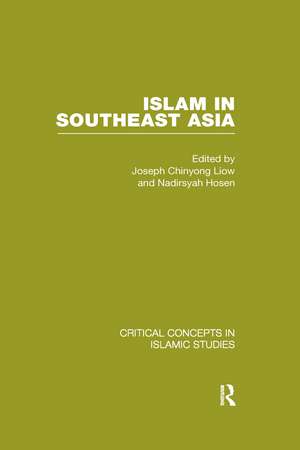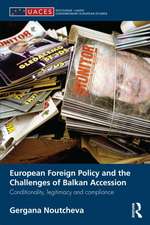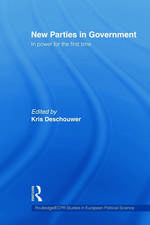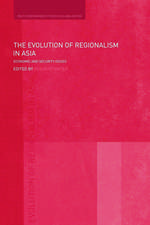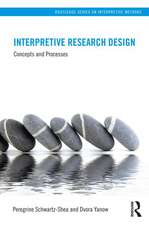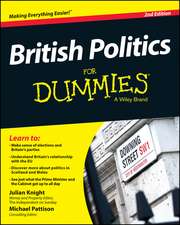Islam in Southeast Asia: Critical Concepts in Islamic Studies
Editat de Joseph Liow, Nadirsyah Hosenen Limba Engleză Hardback – 24 sep 2009
Alongside these pluralistic trends in Southeast Asian Islam are some alternative streams of social-political activism that threaten its traditionally inclusivist character. While most Southeast Asian Muslims are known for their moderation, there has historically been a very small but vocal minority who have been drawn to the more puritanical or extremist variants of the faith. In addition, there is a gradual but clearly discernible trend of conservatism among the general Muslim population, particularly in Malaysia and Indonesia, which has given rise to exclusivist attitudes towards non-Muslims.
The material gathered in Volume I of this new Routledge collection focuses on the historical, cultural, sociological, theological, and intellectual aspects of Islam in Southeast Asia. Volume II, meanwhile, assesses trends in Muslim politics in Southeast Asia, investigating the success and failure of political Islam in the Muslim-majority cases of Indonesia and Malaysia, as well as the Muslim-minority contexts of Thailand, Philippines, and Singapore.
Volume III identifies and analyses the primary actors and agents that are involved in the formation and development of a burgeoning pan-regional parallel civil society network bringing together religiously inspired Islamist NGOs, civil society actors and agencies, the media, professionals’ associations, and political parties; the work collected here charts out a virtual map of the new Islamist activist geography of Southeast Asia. Finally, Volume IV examines the nexus between Islam, politics, and terrorism in the aftermath of the Bali bombings of 2002. It also interrogates the interaction between mainstream political Islam and more extremist fringes of the Islamic communities across the region, as well as domestic and international factors driving radicalism.
Fully indexed and with an introduction newly written by the editors that comprehensively places the collected material in its historical and intellectual context, this new Routledge Major Work is an essential research and teaching resource.
Din seria Critical Concepts in Islamic Studies
- 34%
 Preț: 4239.15 lei
Preț: 4239.15 lei - 34%
 Preț: 6741.77 lei
Preț: 6741.77 lei - 33%
 Preț: 1279.94 lei
Preț: 1279.94 lei - 34%
 Preț: 5482.50 lei
Preț: 5482.50 lei - 34%
 Preț: 4924.98 lei
Preț: 4924.98 lei - 36%
 Preț: 4378.50 lei
Preț: 4378.50 lei - 34%
 Preț: 6183.03 lei
Preț: 6183.03 lei - 34%
 Preț: 3961.32 lei
Preț: 3961.32 lei - 34%
 Preț: 5486.58 lei
Preț: 5486.58 lei - 34%
 Preț: 6188.11 lei
Preț: 6188.11 lei - 34%
 Preț: 6191.18 lei
Preț: 6191.18 lei - 34%
 Preț: 4233.57 lei
Preț: 4233.57 lei - 33%
 Preț: 3697.55 lei
Preț: 3697.55 lei - 34%
 Preț: 6186.14 lei
Preț: 6186.14 lei - 34%
 Preț: 6739.46 lei
Preț: 6739.46 lei - 34%
 Preț: 6173.50 lei
Preț: 6173.50 lei - 34%
 Preț: 7295.07 lei
Preț: 7295.07 lei
Preț: 6189.19 lei
Preț vechi: 9366.98 lei
-34% Nou
Puncte Express: 9284
Preț estimativ în valută:
1184.32€ • 1239.64$ • 985.71£
1184.32€ • 1239.64$ • 985.71£
Carte tipărită la comandă
Livrare economică 31 martie-14 aprilie
Preluare comenzi: 021 569.72.76
Specificații
ISBN-13: 9780415476805
ISBN-10: 0415476801
Pagini: 1744
Dimensiuni: 156 x 234 mm
Greutate: 3.39 kg
Ediția:1
Editura: Taylor & Francis
Colecția Routledge
Seria Critical Concepts in Islamic Studies
Locul publicării:Oxford, United Kingdom
ISBN-10: 0415476801
Pagini: 1744
Dimensiuni: 156 x 234 mm
Greutate: 3.39 kg
Ediția:1
Editura: Taylor & Francis
Colecția Routledge
Seria Critical Concepts in Islamic Studies
Locul publicării:Oxford, United Kingdom
Cuprins
Volume I: Southeast Asian Islam: Histories, Cultures, and Identities Volume II: Muslim Politics in Southeast Asia: Discourses and Practices Volume III: Betwixt Local and Global: Islamic Civil Society in Southeast Asia Volume IV: The Myth of the ‘Second Front’: Muslim Southeast Asia and the War on Terror
Descriere
The Islamic community in Southeast Asia is widely regarded as one of the most moderate and tolerant in the Muslim world. While most of the region’s Muslims are Sunni and fairly orthodox, the Islamic faith as practised in the region has historically been a syncretic blend of Islam, Hinduism, Buddhism, and folk religions. The syncretic roots of Southeast Asian Islam also underscores the pluralistic nature of Islam in the region today, where Muslims have generally lived peacefully in religiously mixed communities, even in areas where they constituted a large majority.
Fully indexed and with an introduction newly written by the editors that comprehensively places the collected material in its historical and intellectual context, this new Routledge Major Work is an essential research and teaching resource.
Fully indexed and with an introduction newly written by the editors that comprehensively places the collected material in its historical and intellectual context, this new Routledge Major Work is an essential research and teaching resource.
